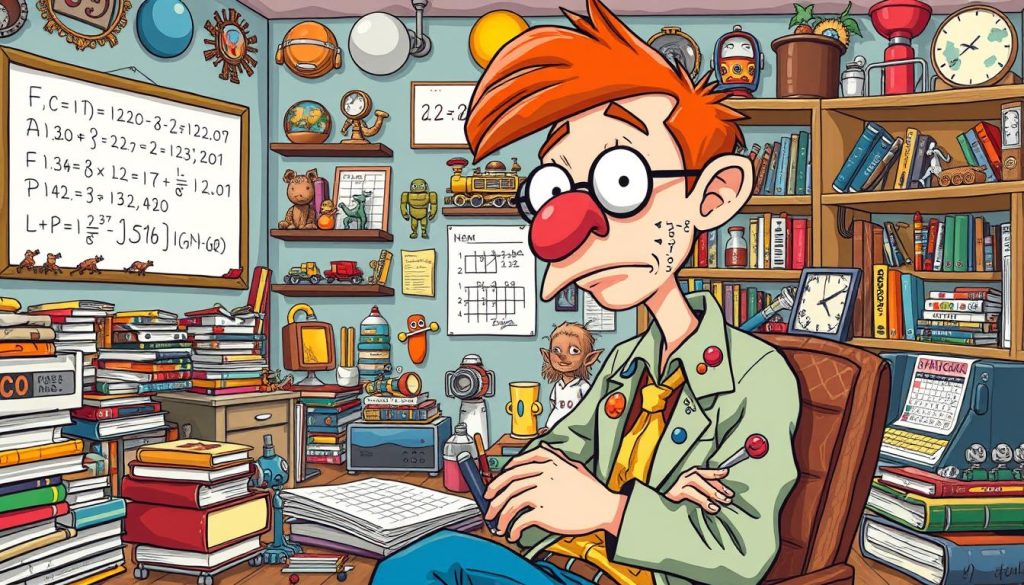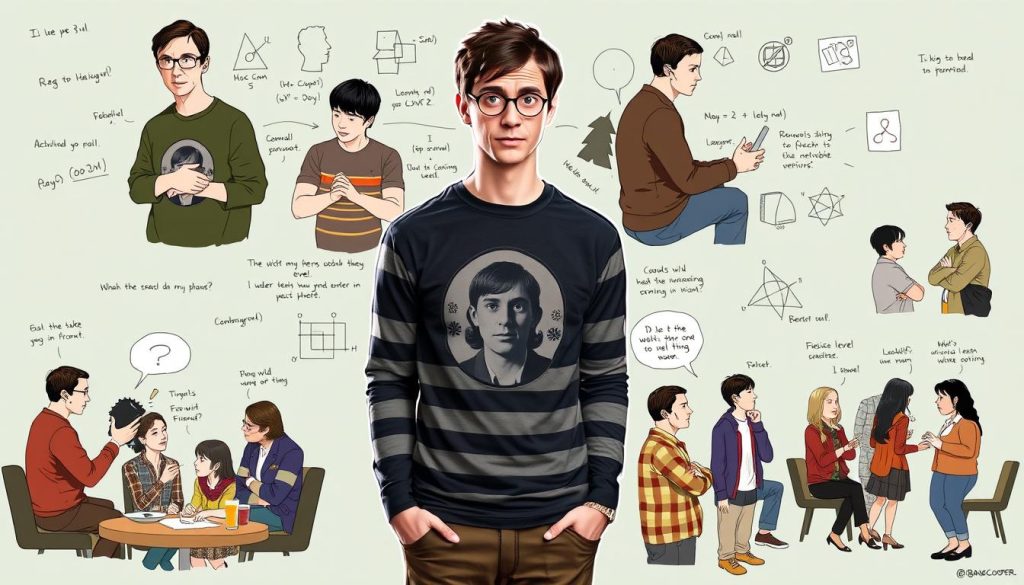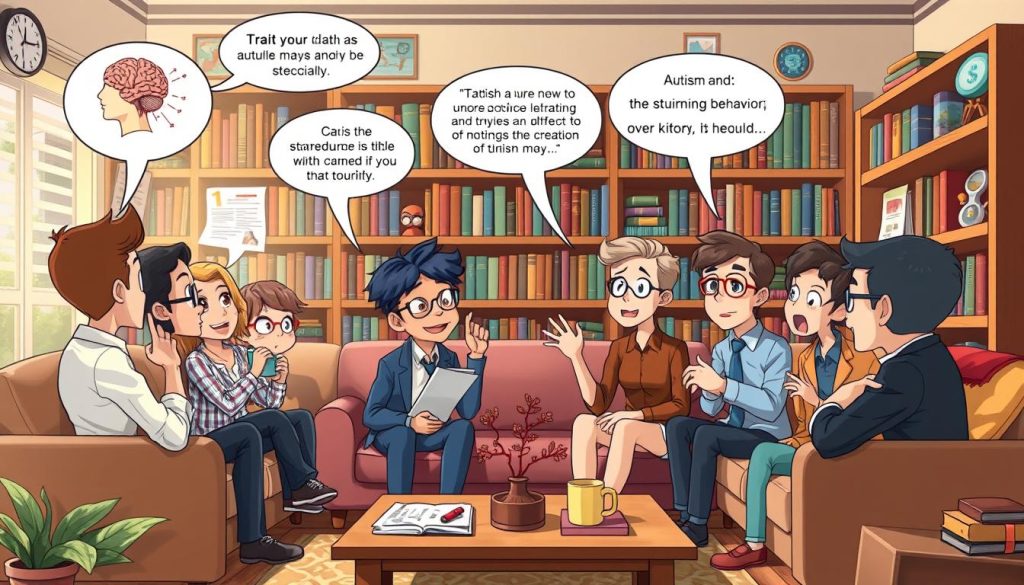The Big Bang Theory was a hit with its unique characters, like Sheldon Cooper. His odd behaviors and social quirks made fans wonder: does Sheldon have autism? This question has sparked interesting talks about autism spectrum disorder and how it’s shown in TV shows.
Sheldon shows traits often linked to autism, like sticking to routines and missing social hints. But the show never said he has autism. This mystery has made people even more curious about Sheldon’s connection to autism spectrum disorder.
Looking into The Big Bang Theory, we’ll check out the signs that make people think Sheldon might have autism. We’ll see how his character has changed how people see autism in TV. It’s also started important talks about neurodiversity in entertainment.
Understanding Autism Spectrum Disorder in Pop Culture
Pop culture shapes how we see autism spectrum disorder. TV shows and movies introduce characters with autism. This helps us learn more about it. The Big Bang Theory is a great example.
Media Representation of Neurodiversity
TV shows now feature more characters with autism. This lets viewers see life through their eyes. Some shows highlight high-functioning autism, while others show other parts of the spectrum.
Impact on Public Awareness
These TV shows have raised awareness about autism. People now understand more about social skills deficits and other signs. This has sparked more conversations about autism in everyday life.
Breaking Down Stereotypes Through Television
Shows like The Big Bang Theory challenge old ideas about autism. They show that people with autism can be smart, funny, and have friends. This helps viewers see beyond stereotypes and understand autism better.
By featuring characters with autism in different roles, TV is changing how we view autism spectrum disorder. This is a big step towards better understanding and acceptance of people with autism in our society.
Does Sheldon Big Bang Theory Have Autism – A Deeper Analysis
Sheldon Cooper from The Big Bang Theory has sparked many debates. His unique traits and genius have made fans wonder if he has autism.
An in-depth look at Sheldon shows traits often seen in autism. He sticks to routines, has trouble with social cues, and focuses intensely on certain topics. These behaviors are common in people with autism.

| Trait | Description | Potential Link to Autism |
|---|---|---|
| Social Awkwardness | Struggles with sarcasm and social norms | Common in ASD |
| Routine Dependence | Strict adherence to schedules | Typical in autism |
| Sensory Sensitivities | Aversion to certain sounds or textures | Often seen in ASD individuals |
| Intense Focus | Deep knowledge of specific topics | Characteristic of autism |
These traits might suggest Sheldon has autism. But, it’s important to remember he’s a fictional character. His genius and quirks might be exaggerated for comedy. Trying to diagnose a fictional character is tricky and should be done carefully.
The Creation of Sheldon Cooper’s Character
Sheldon Cooper, a key character from The Big Bang Theory, was created through a mix of creative vision and Jim Parsons’ acting. This combination made Sheldon a favorite for over a decade.
Writers’ Original Vision
Chuck Lorre and Bill Prady, the show’s creators, saw Sheldon as a smart but awkward physicist. They wanted to show how a genius deals with everyday life. This idea became the basis for Sheldon’s character, captivating audiences for years.
Jim Parsons’ Interpretation
Jim Parsons made Sheldon come alive with his unique style and straight-faced acting. His performance made Sheldon more than just a nerd. Parsons’ work turned Sheldon into a beloved character in The Big Bang Theory.
Character Development Through Seasons
Sheldon changed a lot over the show’s 12 seasons. He went from being strict and insensitive to more caring and understanding. His growth was clear in his relationships, like with his wife, Amy Farrah Fowler.
| Season | Key Character Development |
|---|---|
| 1-3 | Established as brilliant but socially inept |
| 4-6 | Begins to form deeper friendships |
| 7-9 | Develops romantic relationship with Amy |
| 10-12 | Shows significant emotional growth, gets married |
Common Traits of Asperger’s Syndrome in Sheldon
Sheldon Cooper from The Big Bang Theory shows traits of Asperger’s syndrome, a form of high-functioning autism. The show’s creators never said he had it, but his actions match many signs of the condition.

Sheldon loves physics and science a lot. He gets really into these topics, showing a deep interest. This is similar to how people with Asperger’s focus on their special interests.
He also likes things to be the same every day. This includes his spot on the couch and his meal times. This need for routine is common in those with high-functioning autism.
But Sheldon finds it hard to talk to people. He doesn’t always get sarcasm or understand feelings. This is a big part of Asperger’s syndrome. He also likes to explain things in detail, which is another common trait.
- Intense focus on specific interests
- Adherence to routines
- Difficulty with social cues
- Literal interpretation of language
- Challenges with empathy
Sheldon’s character helps bring attention to Asperger’s syndrome. But it’s key to remember that autism affects people in different ways. Sheldon’s story gives us a peek into some parts of high-functioning autism, starting important talks about neurodiversity in TV and movies.
Social Interaction Patterns of Sheldon Cooper
Sheldon Cooper’s social interactions in “The Big Bang Theory” show traits linked to autism spectrum disorder. His character mirrors common social challenges faced by many on the spectrum.
Difficulty Reading Social Cues
Sheldon often misses out on subtle social hints, causing awkward moments. He has trouble reading facial expressions, body language, and tone of voice. This misunderstanding leads to problems with his friends and workmates.
Literal Interpretation of Language
Sheldon’s literal way of understanding language is a key trait. He misses sarcasm, idioms, and metaphors, seeing things as they are literally. This is a common issue for those with autism spectrum disorder, who find abstract language hard to grasp.
Challenges with Empathy
Sheldon has trouble understanding and showing empathy towards others’ feelings. He often doesn’t notice when his friends are upset or need emotional support. This is a common challenge for those with autism spectrum disorder.
| Social Interaction Pattern | Example from the Show | Related Autism Trait |
|---|---|---|
| Misreading social cues | Failing to recognize sarcasm | Difficulty with non-verbal communication |
| Literal interpretation | Taking idioms at face value | Concrete thinking patterns |
| Empathy challenges | Not comforting upset friends | Trouble understanding others’ emotions |
Routine and Ritual Behaviors Exhibited by Sheldon
Sheldon Cooper from The Big Bang Theory shows traits linked to autism spectrum disorder. His strict adherence to routines and rituals is key to his character. These habits shape his daily life and how he interacts with others.

Sheldon plans his day down to the last detail, from breakfast to bathroom habits. He always sits in his favorite spot on the couch, saying it’s perfect for everything. His social life is also ruled by routine, making it hard for him to handle surprises or changes.
He knocks on doors three times and calls out the person’s name. This funny habit shows a common autism trait. Sheldon’s love for order often causes problems with his friends and workmates, who find him too rigid.
- Strict adherence to meal schedules
- Specific seating arrangements
- Repetitive knocking patterns
- Resistance to changes in plans
Sheldon’s quirks are both funny and enlightening. They show the challenges people with autism face. His story helps us understand how routines and rituals affect social life and daily tasks. It adds to our understanding of neurodiversity in media.
Special Interests and Obsessive Tendencies
A Sheldon Cooper character analysis shows his deep focus on certain topics. This is often seen in people with high-functioning autism. His fascination with specific subjects goes beyond just being interested.
Physics and Science Focus
Physics is Sheldon’s world. He sees science in everything, connecting simple things to complex theories. This intense focus is common in those with autism spectrum disorders.
Collecting Behaviors
Sheldon loves to collect things. From comic books to action figures, he organizes them in his own way. This collecting brings him comfort and control.
Train Fascination
Trains are Sheldon’s passion. He knows everything about them, showing his narrow interests typical of autism. This hobby brings him joy and helps him cope with stress.
Sheldon’s special interests and obsessive tendencies are key to his personality. They entertain and teach us about autism spectrum disorders. They show how focused passions can shape someone’s life and how they interact with others.
Sensory Processing Characteristics
Sheldon Cooper’s actions in The Big Bang Theory show traits found in autism spectrum disorder. His quirks with sensory processing add depth to his character. They also spark talks about neurodiversity in TV shows.

Sheldon is very sensitive to touch. He doesn’t like handshakes, hugs, or being touched. This is because he prefers his personal space, a common trait in autism.
He also has trouble with loud sounds. Whether it’s Leonard’s snoring or Penny’s music, he finds it hard to handle. People with autism often feel overwhelmed by noise.
Sheldon is picky about his food. He has specific meals for certain days of the week. This shows his sensory sensitivities, common in autism.
Sheldon notices small changes in his environment. He picks up on things like temperature changes or furniture shifts. This keen awareness is often seen in people with autism.
His sensory traits have sparked debate about whether Sheldon has autism. The show doesn’t say he does, but his portrayal has helped raise awareness. It shows how different people can experience and interact with their surroundings.
Communication Style and Social Relationships
Sheldon Cooper’s way of talking is a big part of The Big Bang Theory. His social skills issues make his interactions funny and sometimes tough. Let’s see how his relationships change over the series.
Interactions with Leonard
Sheldon and Leonard’s friendship is key to the show. Leonard helps Sheldon deal with the world, even with Sheldon’s oddities. Their relationship includes:
- Frequent misunderstandings because of Sheldon’s literal views
- Leonard patiently explaining social rules to him
- Sheldon counting on Leonard for everyday tasks
Relationship with Amy
Amy Farrah Fowler changes Sheldon a lot. Their bond shows:
- Sheldon slowly getting better at showing feelings
- Amy helping Sheldon grasp social hints
- Sheldon trying to mix his routines with love life
Group Dynamic Changes
Sheldon’s interactions with the group change over time. A close look at Sheldon reveals:
| Season | Social Growth | Group Response |
|---|---|---|
| Early | Limited empathy, rigid behaviors | Frustration, accommodation |
| Middle | Increased self-awareness | Better understanding, support |
| Late | Improved social skills | Acceptance, celebration of growth |
The Big Bang Theory shows how hard it is to connect with someone who struggles socially. But it also shows how understanding and growth are possible.
Executive Functioning and Daily Life Skills
Sheldon Cooper’s actions in The Big Bang Theory show traits of high-functioning autism. His skills in planning, organizing, and finishing tasks are key to his daily life.
Sheldon is great at solving complex problems and remembering things. He plans his day down to the minute, showing off his organizational skills.
But, Sheldon finds it hard to be flexible and adapt to new situations. His strict routine often gets him into funny situations. This shows the challenges people with autism face when things don’t go as planned.
- Struggles with time management
- Difficulty prioritizing tasks
- Challenges in emotional regulation
Sheldon’s behaviors match those of people with high-functioning autism. Even though the show doesn’t say Sheldon is autistic, it helps people understand neurodiversity. It shows how it affects daily life skills.
Emotional Expression and Recognition
Sheldon Cooper’s struggles with emotions show common traits of autism spectrum disorder. His character highlights social skills deficits many face daily.
Managing Strong Emotions
Sheldon reacts intensely to everyday situations. His outbursts and meltdowns when routines change show the emotional struggles of autism. These moments offer a glimpse into the complex feelings of those with autism.
Understanding Others’ Feelings
Sheldon has trouble recognizing and understanding others’ emotions. This is a common trait in autism spectrum disorder. His literal views and missing social cues often cause misunderstandings with friends and colleagues.
Throughout the series, Sheldon works on understanding emotions better. This journey highlights the challenges and growth for those with autism in emotional intelligence and empathy.
The Evolution of Sheldon’s Social Skills

Sheldon Cooper’s journey in The Big Bang Theory is truly remarkable. At the beginning, his social skills were quite limited. He often missed social cues and made comments that were not well-received.
As the series went on, Sheldon started to change. His relationship with Amy Farrah Fowler was key in this transformation. Through their interactions, Sheldon learned to show emotions and think about others’ feelings.
Sheldon’s growth is marked by several important moments:
- Learning to comfort friends during tough times
- Developing a sense of humor and understanding jokes
- Showing affection towards Amy and other characters
- Compromising on his rigid routines for the sake of others
This change in Sheldon adds depth to The Big Bang Theory characters. It challenges our initial views and sparks conversations about neurodiversity in media. Sheldon’s journey shows that social skills can be improved over time, even for those who face challenges.
Expert Opinions on Sheldon’s Behavioral Patterns
Sheldon Cooper’s character has sparked discussions among experts about his possible autism spectrum disorder. Psychologists and autism specialists have analyzed his behaviors. They offer insights into how neurodiversity is portrayed on TV.
Psychologist Perspectives
Many psychologists say Sheldon shows traits often seen in autism spectrum disorder. His strict routines, trouble with social cues, and deep focus on certain topics match common autism behaviors.
Experts also say Sheldon’s behaviors might be exaggerated for comedy. This makes it hard to say for sure if he has autism. They point out that autism is a complex condition that varies a lot from person to person.
Autism Specialist Insights
Autism specialists say Sheldon’s traits are similar to those of people with high-functioning autism or Asperger’s syndrome. His smartness, social awkwardness, and sensitivity to sounds and textures are common in autism.
| Behavioral Trait | Sheldon Cooper | Typical in Autism |
|---|---|---|
| Social difficulties | Struggles with sarcasm and social norms | Common |
| Intense interests | Obsession with physics and trains | Frequent |
| Rigid routines | Strict adherence to schedules | Often observed |
| Sensory sensitivities | Aversion to certain sounds and textures | Typical |
Experts agree that Sheldon’s character helps raise awareness about autism spectrum disorder. But they warn against using TV shows for self-diagnosis or stereotypes. Understanding autism needs professional evaluation and knowing each person’s unique experience.
Impact on Autism Awareness and Understanding
Sheldon Cooper from The Big Bang Theory has started important talks about autism spectrum disorder. His unique behaviors and social struggles have made people think he might be on the spectrum. This has both helped and hurt how people see autism.
Sheldon’s character has brought attention to neurodiversity. Many have learned about autism traits from watching the show. This has led to more talks about autism spectrum disorder in our daily lives.
But there’s a negative side too. Sheldon’s portrayal might make people think autism is only about being a genius or struggling with social cues. This oversimplification can cause misunderstandings about the variety of autism.
| Positive Impact | Negative Impact |
|---|---|
| Increased visibility of neurodiversity | Reinforcement of stereotypes |
| Sparked conversations about autism | Oversimplification of autism traits |
| Encouraged empathy for different behaviors | Potential misrepresentation of autism spectrum |
Sheldon’s character has definitely changed how people see autism. The show has helped bring more realistic views of neurodiversity to TV. This has led to a better understanding and acceptance of different behaviors in society.
Comparing Sheldon to Other TV Characters with Autism Traits
Sheldon Cooper from The Big Bang Theory is a standout among TV characters with autism-like traits. His mix of genius and social awkwardness has won over many fans. Other shows have also introduced characters on the autism spectrum, each adding a new view to how autism is shown in media.
Dr. Shaun Murphy from The Good Doctor is another brilliant character, like Sheldon. Both struggle with understanding social cues. But Shaun’s autism is clearly stated, unlike Sheldon’s, which has sparked debates about how autism is portrayed on TV.
Sam Gardner from Atypical offers a unique look at autism. Unlike Sheldon’s love for physics, Sam is fascinated by Antarctica. Both shows show how these interests shape their characters and relationships, showing the varied experiences of those on the spectrum.
These characters help us understand autism better in popular culture. Sheldon may not be a perfect example, but he’s part of a growing group of TV characters. They challenge old stereotypes and help raise awareness about neurodiversity.
FAQ
Q: Does Sheldon Cooper from The Big Bang Theory have autism?
A: Sheldon’s traits might suggest he has autism, but it’s not confirmed. The show’s creators have kept his diagnosis a mystery. This leaves fans to interpret his behavior.
Q: What are some signs that suggest Sheldon might be on the autism spectrum?
A: Signs include trouble with social cues and literal language. He sticks to routines and focuses intensely on interests. He also has sensory sensitivities and struggles with empathy, traits common in ASD.
Q: How has Sheldon’s character impacted autism awareness?
A: Sheldon has raised awareness about autism-like traits. His portrayal has sparked discussions on neurodiversity. It has also challenged stereotypes about ASD.
Q: Did the writers intend for Sheldon to be autistic?
A: The creators didn’t aim to make Sheldon autistic. They wanted to create a unique, eccentric genius. They didn’t attach a specific diagnosis to him.
Q: How does Sheldon’s behavior compare to Asperger’s syndrome?
A: Sheldon’s traits match Asperger’s syndrome, now part of the autism spectrum. He has social difficulties, intense interests, and strict routines. But remember, fictional characters shouldn’t be used for diagnosis.
Q: How does Sheldon’s character evolve throughout the series?
A: Sheldon improves his social skills and emotional understanding over time. His relationship with Amy Farrah Fowler is key. It helps him become more empathetic and socially aware.
Q: Are there other TV characters similar to Sheldon in terms of autism-like traits?
A: Yes, characters like Abed Nadir from “Community” and Saga Norén from “The Bridge” share traits with Sheldon. They help show neurodiversity in media.
Q: What do experts say about Sheldon’s behavioral patterns?
A: Experts have mixed opinions on Sheldon’s traits. Many see signs of ASD, but caution against diagnosing fictional characters. Some praise the character’s impact, while others worry about stereotypes.


















